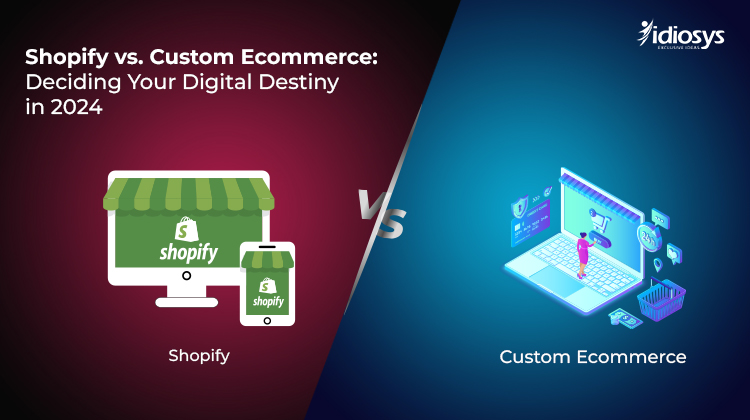Shopify vs. Custom Ecommerce: Deciding Your Digital Destiny in 2024
The e-commerce scene is changing at an accelerated rate as 2024 approaches. The decision of which platform to choose is becoming more and more important for both new and established enterprises. The scene is dominated by two options: the infinite possibilities of custom-built websites and the charming user-friendliness of Shopify. But in the upcoming year, which will be the best ecommerce platform and the most appropriate platform for your internet business?
Shopify: The Temptation of Simplicity
Imagine a platform that lets you build a full-fledged online store without a single line of code. That’s the magic of Shopify. Its drag-and-drop interface, pre-built themes, and vast app ecosystem make it a dream come true for tech novices. Setting up your shop, managing inventory, and processing payments are all handled with intuitive ease. Plus, Shopify’s robust infrastructure ensures scalability, allowing you to seamlessly grow your business without worrying about technical limitations.
Pros of Shopify:
Ease of Use: Even a complete beginner can launch a professional-looking store within hours.
Scalability: Shopify can handle massive traffic and order volumes, making it future proof.
Security: Shopify’s secure hosting takes care of data protection and PCI compliance.
App Ecosystem: Thousands of third-party apps cater to every aspect of your online business, from marketing to logistics.
Support: Shopify offers excellent customer support, ensuring you’re never alone in your e-commerce journey.
Cons of Shopify:
Limited Customization: While themes offer flexibility, you’re ultimately confined within the Shopify framework.
Subscription Fees: Monthly fees can add up, especially for growing businesses.
Transaction Fees: Shopify takes a cut of every transaction, impacting your profit margins.
Lack of Control: You have limited access to the underlying code, making advanced customization difficult.
Custom E-commerce: Building Your Dream Store
For those who crave complete control and individuality, custom-built websites offer a world of possibilities. You can hire web developer from a ecommerce consulting firm to craft a unique online store tailored to your specific brand vision and business needs. From bespoke functionalities to cutting-edge design, the options are limitless.
Pros of Custom E-commerce:
Unparalleled Customization: You have complete control over every aspect of your store, from design to functionality.
Unique Brand Identity: Create a truly distinct online presence that sets you apart from the competition.
Scalability and Flexibility: Custom websites can be built to accommodate any future growth plans.
Advanced Features: Integrate unique features and functionalities that Shopify simply can’t offer.
Ownership and Control: You own the code and data, giving you complete control over your online space.
Cons of Custom E-commerce:
Higher Costs: Development and maintenance costs can be significantly higher than Shopify.
Technical Expertise: Requires collaboration with a web development company, which necessitates a good working relationship.
Time Investment: Building a custom website takes time and effort, delaying your launch date.
Security and Maintenance: You’re responsible for website security and ongoing maintenance.
The 2024 Crossroads: Making the Right Choice
So, which path should you take? The answer, as always, depends on your specific needs and goals. Consider these factors:
Technical Expertise: If you’re comfortable with technology, Shopify might be a good fit. For a more complex vision, consider partnering with a website development company.
Budget: Shopify’s subscription fees are predictable, while custom development requires upfront investment.
Growth Plans: If you anticipate rapid growth, a custom website might be a better long-term investment.
Brand Identity: If a unique online presence is crucial, custom development offers greater flexibility.
Unleashing Scalability with Custom E-commerce
The attractiveness of quick launches and pre-built functionalities might draw you towards Shopify’s. Yet, for brands with ambitious visions and long-term aspirations, the answer to 2024’s ecommerce conundrum lies in a bolder direction: custom ecommerce.
Forget the shackles of cookie-cutter themes and limited feature sets. Custom ecommerce platforms, crafted by skilled website development companies, are built to expand alongside your ambition. Unlike Shopify’s subscription model, your custom investment grows with you, adapting and scaling effortlessly to accommodate your evolving needs. Imagine integrating bespoke loyalty programs, AI-powered product recommendations, or hyper-personalized customer journeys – possibilities on Shopify remain confined to the platform’s capabilities.
The initial development cost may seem daunting but consider it a strategic investment in your future. As your business blossoms, your custom website won’t simply chug along – it will surge ahead, accommodating exponential traffic, complex data integrations, and even unforeseen innovations. This agility is the lifeblood of any scalable business, and custom e-commerce serves as its beating heart.
Shopify’s ease of use is valuable, but true success lies in crafting a digital haven that reflects your brand’s unique essence and seamlessly navigates the ever-shifting e-commerce landscape. In 2024, it’s not just about getting online, it’s about owning your online identity and soaring beyond limitations. Custom ecommerce solutions empowers you to do just that – it paints your vision onto the digital canvas, pixel by pixel, building a scalable fortress of brand loyalty and business growth.
Remember, choosing a platform is choosing your future. For those who dare to dream big and scale relentlessly, custom e-commerce beckons.
——————————————————————————————————
Which is better: Shopify or custom ecommerce?
It depends on your business needs. Shopify is great for ease of use and quick setup, while custom ecommerce offers more flexibility and scalability.
Can a custom ecommerce site be used for any business size?
Yes, a custom ecommerce site can be tailored for any business size, from small startups to large enterprises.
How long does it take to set up a custom ecommerce site?
It can take several weeks to months, depending on the complexity and features required.
Which platform offers better scalability?
Custom ecommerce sites offer more scalability for complex needs, while Shopify can handle substantial growth but with some limitations.
Which is better for branding: Shopify or custom ecommerce?
Custom ecommerce is better for unique branding as it allows complete control over design and user experience.
——————————————————————————————————
You May Also Read
